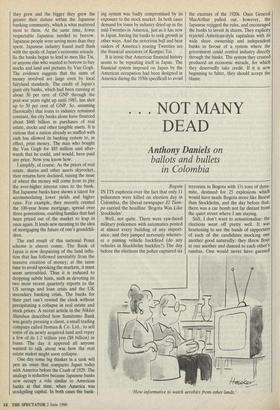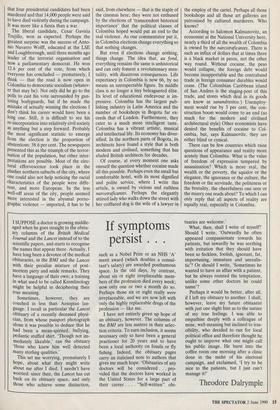. . . NOT MANY DEAD
Anthony Daniels on
ballots and bullets in Colombia
Bogota IN ITS euphoria over the fact that only 11 policemen were killed on election day in Colombia, the liberal newspaper El Tiem- po carried the headline 'Bogota Was Like Stockholm'.
Well, not quite. There were raw-faced military policemen with automatics posted at almost every building of any import- ance, and they jumped nervously whenev- er a passing vehicle backfired (do any vehicles in Stockholm backfire?) The day before the elections the police captured six
terrorists in Bogota with 11/2 tons of dyna- mite, destined for 25 explosions which would have made Bogota more like Beirut than Stockholm, and the day before that, there was a car bomb not far distant from the quiet street where I am staying.
Still, I don't want to sensationalise: the elections went off pretty well. It was heartening to see the bands of supporters of each of the candidates mocking one another good naturedly: they threw flour at one another and danced to each other's rumbas. One would never have guessed
`How informative to watch aerobics from other lands.'
that four presidential candidates had been murdered and that 14,000 people were said to have died violently during the campaign. It was more like a fiesta than a war.
The liberal candidate, Cesar Gaviria Trujillo, won as expected. Perhaps the greatest surprise was the success of Anto- nio Navarro Wolff, educated at the LSE and Loughborough, until three months ago leader of the terrorist organisation and now a parliamentary democrat. He won 12.6 per cent of the vote, from which everyone has concluded — prematurely, I think — that the road is now open in Colombia to democratic socialism (whatev- er that may be). Not only did he go to the polls to cast his vote surrounded by gun- toting bodyguards, but if he made the mistake of actually winning the elections I don't think his career would have been a long one. Still, it is difficult to see his re-incorporation into relatively civil society as anything but a step forward. Probably the most significant statistic to emerge from the election is the proportion of abstentions: 58.6 per cent. The newspapers presented this as the triumph of the terror- isation of the population, but other inter- pretations are possible. Most of the elec- toral effervescence took place in the plusher northern suburbs of the city, where one could also not help noticing the racial characteristics of the people were diffe- rent, and more European. In the less Well-off areas of the city, people seemed more interested in the abysmal porno- graphic violence — imported, it has to be said, from elsewhere — that is the staple of the cinemas here; they were not enthused by the elections of 'transcendent historical importance' that the political classes of Colombia hoped would put an end to the real violence. As one commentator put it, in Colombia elections change everything so that nothing changes.
But even if elections change nothing, things change. The idea that, au fond, everything remains the same is unhistorical and can only foment a revolutionary men- taility, with disastrous consequences. Life expectancy in Colombia is now 66, by no means an unrespectable figure. Its middle class is no longer a tiny beleaguered elite. Its level of educational endeavour is im- pressive. Colombia has the largest pub- lishing industry in Latin America and the number of bookshops in Bogota far ex- ceeds that of London. Furthermore, they cater to a much more intelligent taste. Colombia has a vibrant artistic, musical and intellectual life. Its economy has diver- sified. In the northern parts of Bogota, its architects have found a style that is both modern and civilised, something that has eluded British architects for decades.
Of course, at every moment one asks oneself the question whether cocaine made all this possible. Perhaps even the small but comfortable hotel, with its most dignified and polite service, where I write this article, is owned by vicious and ruthless narcotraficantes. Perhaps the elegantly attired lady who walks down the street with her coiffured dog is the wife of a lawyer in the employ of the cartel. Perhaps all those bookshops and all those art galleries are patronised by cultured murderers. Who knows?
According to Salomon Kalmanovitz, an economist at the National University here, nearly a third of all the wealth of Colombia is owned by the narcotraficantes. There is such an influx of dollars that at times there is a black market in pesos, not the other way round. Without cocaine, the peso would collapse, the foreign debt would become insupportable and the contraband trade in foreign consumer durables would cease. (The Colombian Caribbean island of San Andres is the staging-post of this trade, and stores which deal in its goods are know as sanandresitos.) Unemploy- ment would rise by 3 per cent, the con- struction booth would come to an end (so much for the modern and civilised architectural style) Other economists have denied the benefits of cocaine to Col- ombia, but, says Kalmanovitz, they are either blind or cynical.
There can be few countries which raise questions of appearance and reality more acutely than Colombia. What is the value of freedom of expression tempered by assassination? Which is more real, the wealth or the poverty, the squalor or the elegance, the ignorance or the culture, the freedom or the servitude, the politeness or the brutality, the cheerfulness one sees or the misery one reads about? To which I can only reply that all aspects of reality are equally real, especially in Colombia.



















































 Previous page
Previous page